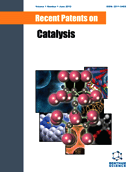Abstract
This review patent summarized the catalytic studies of molybdenum based catalysts for higher alcohols synthesis reported in literature and recent patents. Molybdenum sulfide was the most widely studied catalyst, with Ni, Co, Mn, or Rh as co-catalyst, for higher alcohols synthesis. Molybdenum oxide, molybdenum carbide, and molybdenum phosphide were also reviewed in this paper. Alkali metals, such as K, Rb and Cs, were usually used as promoters. The selectivity of the alkali metal doped MoS2 is strongly dependent on the alkali metal used. Molybdenum based catalysts have the following benefits: 1) the sulfide-based catalysts require 50 to 100 ppm H2S in syngas stream to maintain the sulfidity of the catalyst. Thus, they are sulfur resistant, and sulfur clean up costs might be reduced; 2) the catalysts are less sensitive to CO2 in the syngas stream than other catalysts. However, catalyst activity can still be inhibited with high amounts of CO2 (>30%); 3) carbon coking does not become a problem even with low H2/CO ratio (i.e. < 2); 4) the major product is nonbranched linear alcohols. Oxide-based catalysts tend to be more active than these sulfide-based catalysts. Molybdenum phosphide catalyst gave lower selectivity for higher alcohols.
Keywords: Alcohols, catalyst, direct synthesis, molybdenum, synthesis gas.
 26
26

